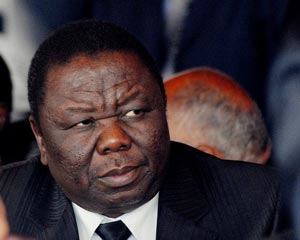
THE two MDC formations share more in common and should agree on an electoral pact to face Zanu PF as a united front in the harmonised elections, analysts have said.
REPORT BY NDAMU SANDU
The Constitutional Court recently ruled that elections should be held by July 31 this year to end the life of the inclusive government formed in 2009.
MDC-T leader Morgan Tsvangirai said last week that he was open to a united front to fight Zanu PF candidate President Robert Mugabe in the make or break polls.
Tsvangirai spoke after the parties had met to resist the holding of elections without the completion of reforms.
But Welshman Ncube, the leader of the smaller MDC formation, told our sister paper, The Zimbabwe Independent that he had “said it over and over again that we are not getting into any coalition with the MDC-T”.
In the past, Ncube had accused MDC-T of getting into bed with Zanu PF to deny him a place on the principals’ table, after Sadc had recognised the MDC leader as a principal instead of deputy premier Arthur Mutambara.
“We now have an alliance between Tsvangirai and Mugabe which also must mean that we now have an alliance between Zanu PF and MDC-T which is working tirelessly against the MDC that I lead,” Ncube has said in the past.
- Chamisa under fire over US$120K donation
- Mavhunga puts DeMbare into Chibuku quarterfinals
- Pension funds bet on Cabora Bassa oilfields
- Councils defy govt fire tender directive
Keep Reading
Are the two MDC formations ideologically poles apart or are there personality clashes between Ncube and Tsvangirai?
Dumisani Nkomo of the Habakkuk Trust said the two MDCs were not ideologically poles apart.
“I think they have more in common than that which divides them. Even in a church, you find some people who sin. One shouldn’t expect that parties are made up of angels,” Nkomo said.
He attributed the reluctance by Ncube for a pact with the mainstream MDC to historical issues and personality differences.
Nkomo said MDC felt let down by MDC-T when there were attempts to unite the two parties ahead of the 2008 harmonised elections. He said Zimbabweans should not read too much into Ncube’s declaration “as in politics, everything is possible”.
“They [MDC] might be trying to build leverage, but it is important for the parties to consider an electoral pact where they agree on one Presidential candidate and one candidate for each constituency. It should not be a big brother-small brother approach but a win-win situation,” Nkomo said.
TSVANGIRAI NEEDS NCUBE’S VOTES TO WIN — ANALYST
Crisis in Zimbabwe Coalition director, McDonald Lewanika said the current electoral map based on 2008 results seems to suggest that Tsvangirai cannot win the first round without Ncube’s votes.
“More than personal gripes or revenge, I think Ncube’s reluctance to talk of a pact now, is based on a power equation. Whatever is perceived as power now and Ncube’s votes now, if they are retained in an election with no clear winner, they quadruple in value,” he said.
Lewanika said Ncube has no real choice than to eventually get into a political bed with Tsvangirai.
“The price of doing that [Ncube agreeing to a coalition with Tsvangirai] is lower now because of the stakes, and will be higher just before an election or in a run- off scenario,” Lewanika said.
Ideologically compatible parties needed
Political analyst, Shakespeare Hamauswa said there was a possibility of a coalition between the MDC formations since they united against Zanu PF over the court ruling. However, for that to happen, Hamauswa said, compromises should be made.
On the coalition between Mugabe and Tsvangirai to deny Ncube a place on the principals’ table, Hamauswa said on reflection Ncube “will realise that it was not necessarily that he didn’t attend because of Tsvangirai but that he had created a monster in Arthur Mutambara”.
He said the political parties have learnt from history what mistakes they have made and have an opportunity to correct them.
In the 2008 elections MDC threw its weight behind independent candidate Simba Makoni.
Tsvangirai got 44,87% of the votes, which were inadequate to secure him the presidential post.
Mugabe got 43,24% while Makoni managed 8,31%.
Had the two formations entered into a coalition, Tsvangirai would have smiled all the way to State House.
Oxford University lecturer, Phillan Zamchiya, said there were key determinants to the formation of a pre-electoral pact and the question was whether these were strongly present in Zimbabwe or not.
Zamchiya said for a coalition to happen, there is need for ideologically compatible parties. He said the two MDC formations are compatible ideologically and very little separates them.
If the electoral threshold to form a government are high, Zamchiya said, parties are encouraged to form a pact.
“In Zimbabwe it is high, you need 50% plus one vote to be President,” he said.
Zamchiya said if political parties have asymmetrical electoral regional strength, then a coalition was more likely and this is moreso if there are trends of identity-based voting rather than issue-based voting.
“The 2008 election shows us MDC-N had support in Matabeleland South and MDC-T in other provinces,” he said.
He said what threatens the coalition is that the parties have asymmetrical electoral strengths. He said the MDC-T had a broader support base compared to MDC-N, adding that it would have been easier if they had relatively the same electoral strength.
Zamchiya said what threatens the coalition was an element of proportional representation, “so smaller parties can thrive without an electoral pact”.









